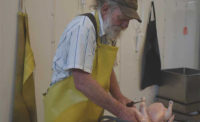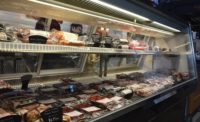Working at Raider Red Meats seldom gets boring. Employees have to harvest animals, cut steaks, and produce the further-processed items like sausages and shelf-stable meat snacks. Some products get delivered to retail customers while others go to local restaurants and foodservice distributors. On top of coordinating with, placing and delivering those orders, employees have a retail store that needs to be managed and a steak gift box program that explodes in popularity during the holiday season.
Oh, and they also have to turn in their homework and study for exams.
Raider Red Meats is the meat business entity for Texas Tech University’s Meat Science & Muscle Biology Department. The company itself has existed since the 1980s in many forms, says Tate Corliss, a Texas Tech alumnus and director for Red Raider Meats. It’s served as a caterer and a processor for the products that were created in the meat science classes. Raider Red Meats’ business model changed in 2008 and has become not only a purveyor of quality steaks and other products but also a unique learning experience for its 30+ student workers.
“We visited with different stakeholders in the industry, and the biggest need from the industry back to the students was the real hands-on experience — the ability to understand how a business operates,” Corliss explains.
Raider Red Meats changed into a for-profit auxiliary enterprise of Texas Tech, becoming a high-end meat market in the school’s Lubbock campus while reaching out to the retail, foodservice and wholesale markets as well.
“Now, we bring in products and harvest animals not only for our teaching, but with the specific purpose to resell it as a branded meat product, as a Raider Red Meats product,” he explains. “We sell about one-third of our products through retail and two-thirds through wholesale and food distribution.”
The profit that the company makes gets put into the Raider Red Meats Endowment. Last year, the company was able to give out its first five $1,000 scholarships to students in the College of Agriculture.
“Anyone who’s put together an endowment knows that can sometimes take 20 years to grow, and we were able to do it from 2008 to 2015,” Corliss explains. “A lot of blood, sweat and tears went into those first few scholarships. The meat business has paper thin margins, so it was really rewarding for me and for all the people who came before me to help make the program what it is today.”
The need-based scholarships went to three students who were animal science or meat science majors, as well as one majoring in plant and soil science and an ag communications student.
“Raider Red Meats is here to serve our community, serve our college and serve our university, and those students really deserved it. I thought it was great that we were able to outside of our own discipline and support other students at Tech,” he adds.
Raider Red meats offers a line of fully cooked items like jerky and snack sticks, as well as a variety of sausages and bacon products. Its brisket and prime rib are popular sellers in Texas, and its steaks are shipped across the country in gift boxes. Area restaurants feature Raider Red Meats steaks on their menus, and several grocery stores carry their bacon and barbecue seasoning, among other products.
Raider Red Meats has five full-time and part-time staff members, but the business is 90 percent student-run. While profit is foremost for the company, as it is for any other meat company, the staff members have the added task of making sure those students come away with a well-rounded education that makes them attractive job candidates once they graduate. Corliss says that he frequently receives calls from potential employers who can’t believe a recent graduate would have such a full resume.
“Students have the opportunity to work at every aspect of the business,” Corliss explains.
The company employs more than 30 students. During their time in the company, those students will work in harvesting, processing and sales. They will take orders from customers and deliver them. If something goes wrong, they will be responsible for getting problems resolved.
“We’re blessed with some great kids from all around the country, and we work really hard to give them the best experience and learning possible. Yes, our goal is to raise money for the Raider Red Meats Endowment, which gives scholarships for the entire College of Ag, but really the main impact that I feel we have is the experiential learning for the students that they’re not getting anywhere else,” Corliss says.
A real learning experience
Some other meat science/animal science schools across the country have an ancillary meat business, but comparatively few have one that matches the scope of Raider Red meats. During the holidays, workers will produce between 25,000 and 30,000 steaks for customers. Another top seller is the smoked prime rib. Corliss estimates they will cut about 2,600 chunks of prime rib a year. A small retail store in Texas Tech’s COWamungs restaurant, which it itself located in the Animal & Food Sciences Building, features a variety of shelf-stable meat snacks, as well as frozen beef cuts, sausages and bacon in coolers. Barbecue sauce, seasonings and Raider Red Meats t-shirts are for sale as well.
The value of having a meat-processing company on campus is not lost on the school faculty.
“Few programs give students the opportunity [for] hands-on experience, and we are fortunate at Texas Tech to have faculty and staff involved in this important educational component for our students,” says Mindy Brashears, Ph.D., a professor of food microbiology and food safety.
She notes the importance of exposing students to the real-life operations of having a meat business.
“This spans from product development to meat production and to marketing. The students also learn the importance of HACCP and other food safety programs, and [they] not only learn about them in the classroom but have the opportunity to participate in an operating HACCP and food safety program that provides product to consumers.
“Having the ability to work with food safety programs and understanding that a failure could result in an actual illness, outbreak or recall helps the students appreciate the importance of doing things the right way,” she adds.
The students who work at Raider Red Meats have the added burden of balancing work life with their academic load, but they appreciate the learning experience of getting practical work experience while still at school.
Thomas Boyle, a Mission, Texas senior, has worked at Raider Red Meats for a full year and calls it one of the best jobs he’s ever had. He’s spent most of his time on the sales side, but he’s helped on the production side as well during busy times. He says that working with customers and problem-solving have been skills that he’ll utilize in his career.
“Sometimes things arise and you just have to go do something [to fix them],” he says. “It’s been really good to be on a personal level with our customers, to have that connection and to help them have a better experience.”
Cody Shannon, a senior from Royse City, Texas, has worked with the company for two years and appreciates the varied experiences he’s had.
“I’ve actually got to work in the back, cutting steaks and harvesting, and I’ve also been in the office, so it’s been a really great experience and not really one that you can get at any other school,” he says.
Reagan Langemeier, a freshman from Marion, Texas, has three older siblings at Raider Red Meats, so she was exposed to the business more than most first-year students. She’s worked in sales, but like Shannon, she hopes to work throughout the business.
“As of now, I can’t drive and make orders for the company [due to her age], but I can tag along and see where our orders are, meet customers and do that kind of networking beforehand,” she explains, “so when I get older and can make deliveries for myself, I can be more personable because I’ve already met with them.”
Raider Red’s strong sales
When Raider Red Meats made the transition to a for-profit business, the decision was made early on that the company had to be a high-quality meat processor as well as an educational opportunity for the students who work there. All of the company’s cuts are wet-aged for a minimum of 21 days, and some bone-in ribeyes, short loins and bone-in strip loins are dry-aged as well. Corliss says that the degree of customization enables its customers to get a truly personalized product.
The decision to maintain a high quality has helped the retail store succeed in spite of its relatively small size and location. Since it is on campus, it’s not the first choice for Lubbock residents to do their shopping. At the same time, the company’s steaks, brisket and prime rib are out of the price range of the typical college student, so it needed non-students to seek it out. Corliss notes that the closest parking lot does have spots for shoppers in an attempt to encourage shoppers to visit the store.
“We’ve tried to make it really user friendly, so focusing on quality over quantity was the best decision that we ever made, because that makes them jump through the hurdles and not just go to the grocery store. That quality that they can’t get anywhere else is what drives them here,” he says.
The Raider Red Meats retail store alone did $350,000 in sales last year, so non-college students are certainly seeking it out.
Along with the store, Raider Red Meats distributes its bacon, sausage, barbecue sauce and seasoning at nine United Supermarket locations. The company also supplies several local and regional restaurants with steaks and other center-of-the-plate options. Several of them do promote the meat’s origin on their menus, appealing to Texas Tech alumni and those who support the local food movement.
Students in the meat science program harvest hogs, lamb and cattle for meat labs and for Raider Red Meats. Raider Red Meats brings in additional beef from Texas processing plants. The company promotes the “go Texan” motto and tries to stay as local as possible for its meat supplies.
Since the business has to operate at the same time that students are taking classes in the meat lab, production has to work around the class schedule, as well as the schedules of its student employees. Fortunately, Corliss notes, scheduling isn’t that difficult. If there is a harvest lab one day, employees can be cutting steaks to avoid creating conflicts.
Thanks to the cooperation between the school and the business, students are able to work on state-of-the-art equipment. The two entities can split the cost of a machine and enjoy the benefits.
“Some labs will go years waiting to get the funding for a new stuffer, but if the meat lab is in need of a stuffer, they pay for a portion, we make up the difference, and when it’s not being used for teaching, we’ll use it,” Corliss explains. “It makes the students more desirable to the industry. They know how to run a cutting-edge stuffer.”
Raider Red Meats’ success and growth will continue to benefit the students who work there as well as Texas Tech itself. As other meat science schools look to add or innovate on their own meat businesses, Corliss notes that the success requires a concerted effort, right to the top of the university.
“It really takes a lot of support from the department, college and university levels to get something like this going, and then having the right staff in place to make it happen,” he says.










Report Abusive Comment